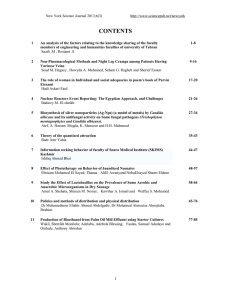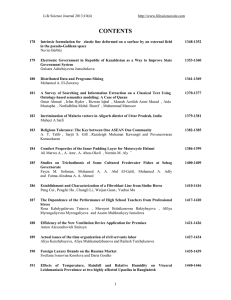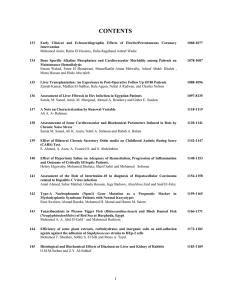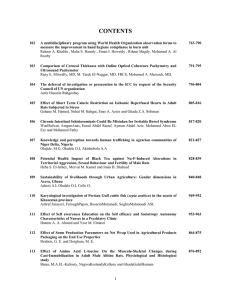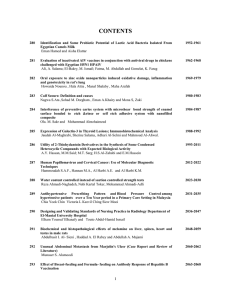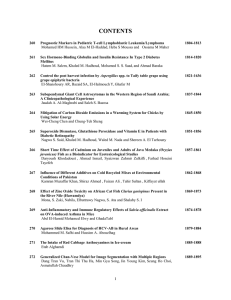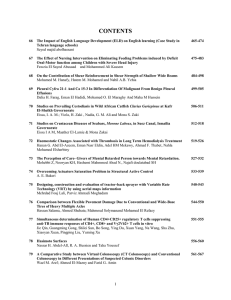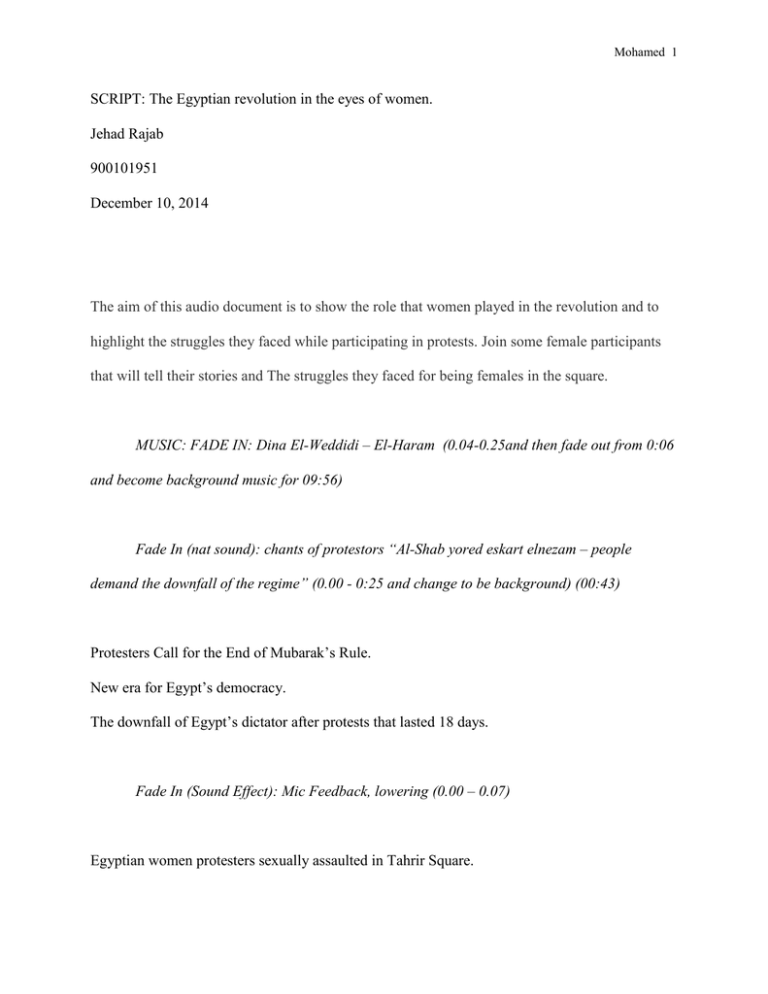
Mohamed 1
SCRIPT: The Egyptian revolution in the eyes of women.
Jehad Rajab
900101951
December 10, 2014
The aim of this audio document is to show the role that women played in the revolution and to
highlight the struggles they faced while participating in protests. Join some female participants
that will tell their stories and The struggles they faced for being females in the square.
MUSIC: FADE IN: Dina El-Weddidi – El-Haram (0.04-0.25and then fade out from 0:06
and become background music for 09:56)
Fade In (nat sound): chants of protestors “Al-Shab yored eskart elnezam – people
demand the downfall of the regime” (0.00 - 0:25 and change to be background) (00:43)
Protesters Call for the End of Mubarak’s Rule.
New era for Egypt’s democracy.
The downfall of Egypt’s dictator after protests that lasted 18 days.
Fade In (Sound Effect): Mic Feedback, lowering (0.00 – 0.07)
Egyptian women protesters sexually assaulted in Tahrir Square.
Mohamed 2
Rape and sexual assault: the hidden side of Egypt’s protests.
500 victims of sexual violence since 2011.
Fade In: (nat sound) chants of protestors “Al-Shab yored eskat elnezam: people demand
the downfall of the regime” (the music changes to be background at 0:13 – 0:25 then main loud)
This is how everything started, the story started in the streets of Cairo and then….everywhere.
The news headlines changed dramatically as time went on. (00:10)
Hadeer Mohamed: “I was completely shocked, I was shocked about the place I once
believed in and the values of the place and ethics that people made after the revolution.” (2:02 –
2:13 = 11)
That was Hadeer Mohamed, a political science student at the American University in Cairo,
describing her experience in protests since the beginning of the revolution on the 25th of January
2011. People who participated in the revolution had different reasons. Some of them went asking
for democracy, others went to change the regime and others went to check what is happening and
why there are many people in the streets. But for Hadeer it was dissatisfaction. (00:31)
01:43 HM: “I participated in the revolution or in the protests in general because I was
dissatisfied with the whole political situation specially that I am studying political science, and I
know, I think I know a bit about the whole situation in Egypt and I studied comparative politics
and I know how it goes in other countries.” (00:21)
Mohamed 3
As motives differ, Nadine Mohamed, a 19-year-old Alexandrian girl had a different reason
behind going to every protest since the 25th of January 2011. (00:12)
02:17 Nadine Mohamed: “I, I felt responsible not only for those I’ve seen their pictures
in videos on the internet, but also for Mohamed BuAzizi he Tunisian vendor who set himself on
fire. I felt it was, it was his right and those who got injured, it is their right that I should be
there.” (00:30)
Women’s participation in protests was significantly high as Nadine describes. (00:05)
02:53 NM: “It shocked me seeing this huge number of women.at the beginning I though it
was only men who would be there.” (00:11)
That was not a surprise for Hadeer as she studies revolutions in Egypt throughout history.
(00:06)
03:11 HM: “Women have been part, a great part of revolutionary history because if ou
compared between what happened in 2011 and throughout the past three years or four years and
what happened in 1919 you will definitely know how women affected the revolution and the
revolutionary wave.” (00:23)
Mohamed 4
Let’s stop here and take a step back. Before continuing our story, we need to know more about
Egyptian women’s participation in revolutions throughout the history. (00:09)
MUSIC: FADE IN: Dina El-Weddidi “El-leil” (0.01-0.12and then fade out from 0:05)
Hoda Sharawi, a feminist and an activist during the 1919 revolution. She organized women’s
demonstrations at that time, and founded the Wafdist Women’s Central Committee in the Wafd
political party, which was the most popular party at the time. For Hadeer, women’s activism was
portrayed in different forms. (00:22)
04:12 HM: “I remember Malak Hefny Nasef, it was not revolutionary but she wrote in a
revolutionary way. She used to like defend women rights about education, about marriage, mixed
marriage and the problems of marriage for Egyptian women, so they were revolutionary.”
(00:21)
MUSIC: FADE IN: Dina El-Weddidi “El-Haram” (0.04-0.15and then changes to be
background from 0:08)
Fade In: (nat sound) chants of protestors “Al-Shab yored eskat elnezam: people demand
the downfall of the regime.” (the music changes to be background then fade out).
Now, let’s go back to our story that started on the 25th of January 2011. The experience of
protesting did not go as well as it was supposed to be for some. (00:12)
Mohamed 5
04:51 HM: “What happened was different also because we found that the great role that
women played during the revolution was noticed and it was affected after that, even in the
protests, they were like, they were attacking women, I have no idea why!” (00:21)
The security that was in Tahrir Square during the 18 days of the 25th of January 2011 changed
into hostility against women in other protests such as in Maspero Protests in October 2011 and
Mohamed Mahmoud events in November 2011. The spirit has changed. (00:21)
05:33 HM:“The first time I felt this was in Mohamed Mahmoud, it was my first sexual
harassment incident inside the Tahrir Square.” (00:10)
The situation in Alexandria for Nadine was similar. Women were also harassed. (00:05)
05:48 NM: “My heart ached every time I faced, I saw an incident or it happened to me. I
felt that this was not the right place and we do not deserve that and if someone who is not in the
protests and he is doing that or he is saying something that is .. I wanted to just scream and I did
not see that this was fair.” (00:31)
In response to sexual harassment that happened in protests and gatherings, Ayman Nagy founded
the Anti-sexual harassment movement. (00:08)
06:29 Ayman Nagy: “There is a lot of mobile assaults and mobile attacks, some of them
Mohamed 6
were organized and some were not. But it happened and like in the day after when we go to the
square with the groups, intervention groups to interfere in sexual harassment and mobile
assaults.” (00:15)
06:43 AN: “To get in the squares to stand against sexual harassment in general.”
(00:03)
For Ayman, the reasons behind sexual harassment are because men feel lack of power and that
leads them to harass others to feel they are strong and in control. But, there is another
explanation that both Ayman and Nadine agree on. (00:16)
07:03 AN: “I cannot say it is a political agenda like to harass women, but it’s been used,
it’s been used against activists, it been used against people who work for human rights and
people who work for political activism and stuff.” (00:14)
And when Nadine was asked about the type of men who were harassing protestors. (00:04)
NM: “probably everyone, the soldiers and ordinary people who were not in the protest or
did not belong to the regime, people who were passing by and thugs and those who belonged to
the authorities, those who were wearing ordinary clothes, but they were spying on the protestors
and police officers and everyone.” (00:36)58 – 1:36” 22 58
Mohamed 7
07:52 MUSIC: FADE IN: Dina El-Weddidi “El-Haram” (07:59 it changes to be main
loud and then fade out from 08:02)
Knowing the problem and facing it is the first step in finding a solution. Ayman has been on the
ground during many protests. He calls on the government to change their approach. (00:10)
08:17 AN: “The government should cooperate more in civil society not to arrest activists
and human rights activists specifically because they just arrest them for working for human
rights, they did nothing wrong.” (00:13)
08:32 AN: “So the second is the law to punish people, like people know that there is, they
are going to be punished if they commit a crime of sexual harassment and highlight that this is a
crime with all the types of sexual harassment starting with harassing people on the internet or
over the phone, to grabbing then which is considered assault not sexual harassment.” (00:21)
As Ayman dealt with many harassment cases, he believes that there is a problem in the
punishment system itself. For him, harassers need rehabilitation. (00:09)
09:03 AN: “If you arrest a harrier and put him in jail for like six months and after six
months he will gout of jail, you think he will be a better person?! I doubt that, personally.”
(00:10)
Mohamed 8
There is hope for a change in the future with organizations that fight harassment in protests.
Organizations like Nazra, I Saw Harassment and HarassMap are also working to defeat this
growing problem. At least there is hope!. (00:14)
This documentary was produced by Jehad Rajab. Special thanks to Hadeer Mohamed, Nadine
Mohamed and Ayman Nagy for the interviews. Music collected from the Album “Tedawar w
Terga3” for Dina elWadidi. The songs are “El-haram”, “Tedawar w Terg3” and “El-leila”.
Sound effects are from freesound.org and nat sounds were gathered by me. (00:23)
Interviews:
Hadeer Mohamed – A political science student at AUC who participated in protests in Cairo.
Nadine Mohamed – A student at the Institute of Arts who participated in protests in Alexandria.
Ayman Nagy – The founder of Anti-sexual harassment movement
Music:
Mohamed 9
Dina El-Weddidi - Tedawar w Tergaa.
-
El-Leila
-
El-Haram
-
Tedawar We Tergaa
Sound Effect: Mic Distortion - freesound.org

